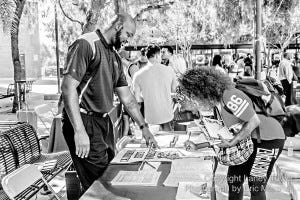Democracy, it seems, will not be deferred this semester at Laney College. The Associated Students of Laney College (ASLC) has appointed Laney freshman Ongelique Pyles as its Elections Committee Chairperson, and she’s determined to make no misstep or mistake in the run-up to the elections on Nov. 24 and 25. “I’m always referring constantly back to the election code and constitution to make sure everything’s in line,” she says, referring to the Peralta Community College District’s Student Election Code, which covers everything from the number of units a student must be enrolled in order to run, to the placement and take-down schedule of campaign posters.
“I’m always referring constantly back to the election code and constitution to make sure everything’s in line,” she says, referring to the Peralta Community College District’s Student Election Code, which covers everything from the number of units a student must be enrolled in order to run, to the placement and take-down schedule of campaign posters.
Pyles’s obsession with following the code is not unwarranted. Last semester, an unprecedented scandal rocked Laney’s campus: the elections were postponed, and then suspended. No candidates ran, no votes were cast — and students’ voices were woefully silenced.
Soon after taking her position, Pyles learned that it was her predecessor who’d been primarily at fault. “The Elections Committee Chairperson didn’t adhere to the Code, and then that was reported, and then things just fell apart from there,” she says.
Candidates — Intended Office
Jon-Mychal — President
Nona Claypool — Vice President
Katrina Totten — Publicity Commissioner
Dagnachew Sibhat — Senator
Mengying Zhou — Senator
Whitney Mao — Senator
Stephan Holloday — Senator
Jarrett Wright, the other member of the Elections Committee, also found the non-election disturbing.
“Its definitely a bad look,” he says. “I think that any time an election doesn’t happen, that’s a student’s voice that doesn’t get heard. Whether or not they wanted to keep the current staff in place or they wanted to replace that staff, it’s their right for their voice to be heard, either way it goes.
“With a denial of election, it’s the denial of a voice. It’s worse than the denial of a vote.”
Pyles and Wright are thus committed to making last semester’s political disaster a one-time event, both fiercely motivated by their commitment to the student body.
“We absolutely won’t have that problem this year,” he says. “We’ve gone way out of our way to make sure we’re adhering to the constitution.”
“And if I feel like I don’t know something, I ask Jarrett, and I always refer back to the documents,” Pyles adds. “I think sometimes I probably think about it too much!”
The two do seem to make a good team, playing off of each other’s efficiency, determination, and organizational skills.
But will it be enough to pull off the first Laney College elections in over a year? After all, making sure the elections process runs smoothly is only one part of the road ahead.
Getting the right candidates into office is an entirely different story.
Quality Candidates?
But it proved difficult to pin down exactly why the elections debacle took place. The story seemed to be one of widespread incompetence: the Elections Committee was never completely formed, the faculty advisor never properly oversaw the elections process, and even when Laney President Dr. Elñora Tena Webb was brought in to resolve the issue, the ultimate decision was to wait and hold “special elections” this semester.
What do Pyles and Wright want to see in their elected officials, the people who will help ensure such a debacle never happens again.
“Organization and competency,” Wright says. “I want my representative… to be clear and focused.
“There are a lot of high-minded ideals that never really meet the ground, and I feel like if you’re not going do anything or put fire behind these great ideas… at that point, it’s just intellectual masturbation.”
Pyles agrees, noting also the amount of power that comes with the offices Laney students hold in their government. “I feel like [ASLC members] should always stand for the students, because this is a community college, which is public,” Pyles says, “so there’s a lot of public money that goes into it — so public interest goes into it as well — and often times, students get left behind.”
Bringing in these kinds of candidates, of course, depends on having strong, focused students in the running, and depending on where you were on campus over the last few weeks, you either knew all about the elections and their requirements — or knew nothing about it at all.
Pyles and Wright did, however, try to hit as many sweet spots as possible. On a campus with over 12,000 students, it seems impossible to reach every last one, so the Committee focused on core classes — visiting English, math, and science classes — but also fringe students, in dance classes and African-American Studies courses.
“My main goal is to ensure that, during the campaign period, we publicize it even more, that even more people know that there’s an election, that even more people make their voices heard and vote,” Pyles says.
So the horizon seems promising: Pyles and Wright are organizing a debate among candidates, and the two are confident about their ability to confront any issues head-on.
It’ll be up to them — and Laney voters — to help pave the way for a newer, stronger ASLC.
Candidate profiles will appear in the next issue of the Laney Tower.

























